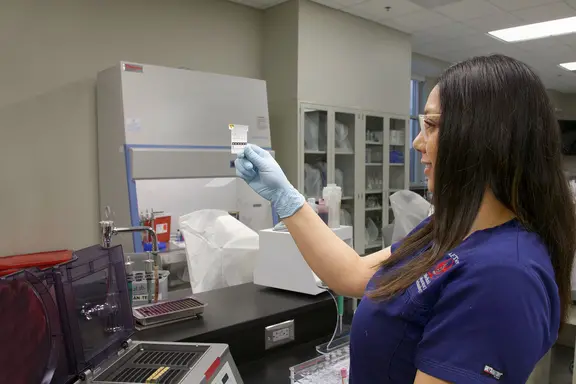This curriculum prepares individuals to perform clinical laboratory procedures in chemistry, hematology, microbiology, and immunohematology that may be used in the maintenance of health and diagnosis/treatment of disease.
Coursework emphasizes mathematical and scientific concepts related to specimen collection, laboratory testing and procedures, quality assurance and reporting/recording, and interpreting findings involving tissues, blood, and body fluids.
Graduates may be eligible to take the Board of Certification for Medical Laboratory Technicians by the American Society of Clinical Pathologists. Employment opportunities include laboratories in hospitals, medical offices, industry, and research facilities.
This program is accredited by the
National Accrediting Agency for Clinical Laboratory Sciences (NAACLS)
5600 N River Rd. Suite 720
Rosemont, IL 60018
- Phone: (773) 714-8880
- Website: NAACLS Website
Specific Requirements
- General college admission requirements.
- High school units:
- High school-level chemistry or college-level Chemistry 092 is required with a grade of C or higher.
- Biology is strongly recommended.
- This program has a selective admission process. See the Selective Allied Health Program Criteria on the Selective and Limited Programs page of the A-B Tech website.
- Acceptable reports of medical examinations by the first day of MLT-252 Practicum I.
- Satisfactory completion of required immunizations by the first day of MLT-252 Practicum I.
- Criminal background checks, drug screens, and seasonal flu vaccines are required prior to admission to clinical sites.
- Current American Heart Association (AHA) Basic Life Support (BLS) for Healthcare Providers certification by the first day of
MLT-252 Practicum I.
Courses requiring a grade of “C” or better: BIO, CHM, and MLT
Good To Know
Why General Education?
You may be asking yourself, “Why do I have to take (course name) when it is not directly related to my major?”
General Education courses will help you develop skills necessary to be successful in your major and in life. General Education can teach you how to talk to your employer, write a paper in a major course, understand interest rates on your car, and much more. General Education can also give you the skills to be a better member of society and a more informed citizen. Critical thinking, global understanding, and appreciation for the human experience are hallmarks of a well-rounded education.
How many hours of General Education do I have to take?
If you are enrolled in an Associate of Applied Science Degree program, a minimum of 15 general education hours are required in the following categories:
- Six hours from Communication
- Three hours from Humanities & Fine Arts
- Three hours from Social & Behavioral Science
- Three hours from Natural Science & Mathematics
General Education courses have been pre-selected for you by your faculty from the following list:
| Communication | Humanities & Fine Arts | Social & Behavioral Science | Natural Science & Mathematics |
|---|---|---|---|
| COM-110 | ART-111 | ECO-251 | BIO-161 |
| COM-120 | ART-114 | ECO-252 | BIO-163 |
| COM-231 | ART-115 | HIS-111 | BIO-168 |
| ENG-110 | HUM-110 | HIS-112 | MAT-110 |
| ENG-111 | HUM-115 | HIS-131 | MAT-121 |
| ENG-112 | MUS-110 | HIS-132 | MAT-143 |
| ENG-114 | MUS-112 | POL-120 | MAT-152 |
| PHI-215 | PSY-150 | MAT-171 | |
| PHI-240 | SOC-210 | PHY-110/110A | |
| SOC-225 | PHY-121 |
Degrees designed to transfer to universities require more general education hours. If you are enrolled in the Associate in Arts or Associate in Science, you are required to take 45 hours of General Education from the following categories:
- Six hours in English Composition
- Six to nine hours in Communication/Humanities & Fine Arts
- Six to nine hours in Social & Behavioral Sciences
- Three to eight hours in Mathematics
- Four to eight hours in Natural Sciences
- 11 to 14 additional General Education hours
If you are enrolled in the Associate in Engineering, you are required to take 42 general education hours from the following:
- Six hours in English Composition
- Six hours in Communication/Humanities & Fine Arts
- Six work hours in Social & Behavioral Sciences
- 12 hours in Mathematics
- 12 hours in Natural Sciences
If you are enrolled in the Associate in Fine Arts in Visual Arts, you are required to take 25 general education hours from the following:
- Six hours in English Composition
- Six hours in Communication/Humanities & Fine Arts
- Six hours in Social & Behavioral Sciences
- Three to four hours in Mathematics
- Four hours in Natural Sciences
Additional information about General Education for transfer degrees, including courses that satisfy each category, may be found in the current College Catalog.
What will I learn in General Education?
At A-B Tech, our faculty have designed a general education core so that A-B Tech graduates will learn the following:
Students will critically evaluate information:
- Students will demonstrate information literacy.
- Students will critique works of human expression.
- Students will analyze scientific literature.
Students will solve problems:
- Students will identify processes.
- Students will analyze problems.
- Students will interpret the results.
- Students will recommend appropriate strategies or solutions.
Students will effectively communicate.
- Students will communicate appropriately about the subject.
- Students will communicate appropriately with the audience.
- Students will communicate appropriately for the medium.
Ever wonder how A-B Tech awards credit for a certain course?
A-B Tech complies with the North Carolina State Board of Community Colleges Code, so your courses are assigned the course level and receive the same amount of credit as courses at all 58 North Carolina Community Colleges.
If you want to read more about this, see the A-B Tech Policy and Procedure for the Assignment of Course Level Credit.


